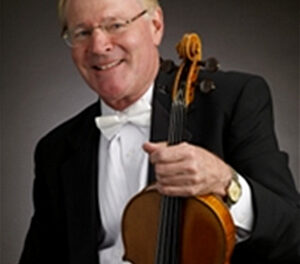Sometimes the “little” programs create big impressions, and such was the case with an evening of tuneful solos and duets (and one hearty quartet) from the Broadway stage, presented by John Kramar and Jami Rhodes of the East Carolina University School of Music voice faculty and eight students. Titled “Ladies and Gents — An Evening of Songs and Duets from Great Broadway Musicals of the Golden Age,” the program served as a showcase for the voices of young people who could be on the stage in the future, and it served to affirm the quality of singing by those who teach the students.
The program concentrated on several well-known musicals and composers beginning with Jerome Kern’s Showboat, and moved through about seven decades to Stephen Sondheim’s Follies. In between were selections from Rodgers and Hammerstein, Gershwin, Lerner and Loewe, and Leonard Bernstein. One considerably less well known musical, Rodgers and Hammerstein’s costly and poorly reviewed Pipe Dream, was represented; a few other hit shows of the Golden Age (Annie Get Your Gun, Kiss Me Kate, Kismet, Music Man, Guys and Dolls, Gypsy, Oliver! or Fiddler on the Roof, for example) might have been better choices.
But the selections that were performed were sung quite well, some splendidly, in fact. Students Katie Lape and Brenton O’Hara opened the program with a well done “Make Believe” from Showboat. Both students have excellent voices, and Ms. Lape also displayed especially fine stage presence and personality.
Several of the students’ numbers were standouts: soprano Kimberly Watson, a small young woman with a huge voice, floated effortlessly to the uppermost part of her range on “Summertime” and showed considerable zest in “Show Me” from My Fair Lady. Baritone Ronald Holmes and soprano Olivia Johnson sang a heartfelt “Bess You Is My Woman Now” from Porgy and Bess, and tenor Todd Barnhill gave a wonderful reading of “Younger Than Springtime.” The quartet of Barnhill, Holmes, O’Hara and baritone Scott Willis sang a spirited version of “There Is Nothing Like a Dame” from South Pacific.
Both Ms. Rhodes, a mezzo-soprano, and Kramar, a baritone, showed their formal musical training and background with “Bill” and “You Are Love,” respectively, at the beginning of the program. Ms. Rhodes moved a little closer to the musical theatre stage, and a little farther from the opera stage, in “Wonderful Guy” from South Pacific, and Kramar had fun with “I’ve Grown Accustomed To Her Face,” even including some of the bridge (patter and a few lines from “”Let a Woman in Your Life”) before ending on a wistful note. Other highlights: Ms. Rhodes’ lively and funny delivery in “What a Movie,” a cleverly worded fast-talk song from Bernstein’s Trouble in Tahiti; and Kramar and Ms. Rhodes in the “Twin Soliloquy” from South Pacific, in which Kramar sang a spot-on version of Ezio Pinza. Kramar also was splendid in “Some Enchanted Evening” and in the quieter “Edelweiss.”
The program and its performers demonstrated a few interesting things. For one, opera singers and musical theatre singers are not interchangeable. Soprano Arlie Honeycutt, for example, showed a fine voice for “One More Kiss” from Follies, but her voice was quite operatic. Ms. Rhodes applied a nice Cockney accent to “Wouldn’t It Be Loverly?” from My Fair Lady, but a hint of a rolled “r” early in the song exposed her operatic background. In fact, the women all showed considerable vibrato in their singing that seemed better-suited to an opera aria than to the popular musical theatre. On the plus side, of course, is the fact that each singer, male and female, had precise enunciation to accompany an extremely musical and melodious voice.
Another finding: there is a reason the 1940s-60s period was known as the Golden Age of Broadway musicals — the music and lyrics generally were unsurpassed. Later musicals, such as Follies, for instance, might be good, some even very good, but they do not compare to their predecessors.
And a third discovery: even the stalwarts of the Golden Age didn’t produce a constant stream of super-hits. The selections from Rodgers and Hammerstein’s Pipe Dream (1955) were pleasant enough — Kramar’s “All Kinds of People” and Kramar and Ms. Rhodes’ “Susie Is a Good Thing” both were clever — but they were not memorable.
Pianist Eric Stellrecht accompanied the singers, supplying both subtlety and substance in excellent fashion during the evening. Because of illness, soprano Carolyn Myers was absent, although she joined the ensemble for a follow-up program in Tarboro the next night.












